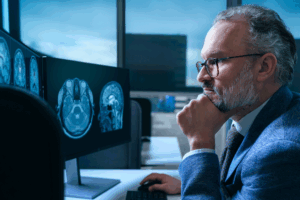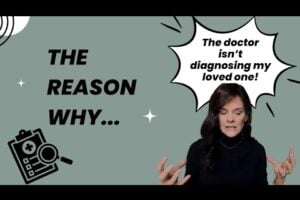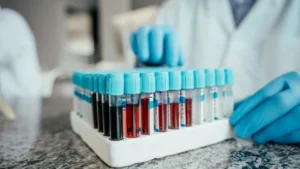Amidst ongoing national debate about healthcare costs, new research unveiled by Siemens Healthcare shows that the vast majority of Americans (92 percent) agree that “the value of knowing exactly what is wrong with their health is as important as having access to a doctor in the first place” and nearly four in five Americans (78 percent) would want to have a test done to diagnose a disease, even if there is no treatment or cure available. This survey was conducted online within the United States by Harris Interactive on behalf of Siemens Healthcare among 2,222 U.S. adults ages 18 and older.
Dr. Gregory Sorensen, CEO of Siemens Healthcare and a board certified neuroradiologist, said,
“There is simply a rational, financial and emotional value to knowing if you are sick. The survey findings show clearly that Americans want to know exactly where they stand when it comes to their health.”
Why Diagnose?
The most common reasons for getting an early diagnosis of a dementia such as Alzheimer’s are:
- It offers a better chance of slowing down the disease
- Making the best provisions for the road ahead
- The emotional value of knowing and preparing
- Legal & financial planning
Medical testing and imaging such as MRI and CT scans, as well as clinical diagnostic tools to help diagnose Alzheimer’s disease, various types of dementia, cancer, coronary disease and other serious illnesses, have come under increased scrutiny as the nation examines healthcare expenditures. However, the survey results show that – despite the belt tightening times for many American families – the majority of U.S. adults see real value in such tests:
- Roughly two-thirds (66 percent) of Americans would even be willing to pay out of their own pocket for tests to diagnose serious illness if there were such a test but it was not covered by their insurance.
- Over half (56 percent) have had and/or someone in their family has had an illness or injury that was at least in part diagnosed using a medical imaging scan.
- Almost nine in ten Americans (87%) agree that ruling out a diagnosis can save money in costly treatments that may not have been needed.
- Eight in ten Americans (83%) agree that even if medical technologies and tests are expensive, they save money in the long run by helping doctors to get to the right diagnosis more quickly.
Great Value
“As a physician, I know first-hand there is great value in excluding a diagnosis. This is a critical step to ensure that patients avoid unnecessary, expensive medical interventions. Medical imaging and diagnostic technologies were not developed to drive up costs. They were developed to improve health,” added Dr. Sorensen.
Other key findings of the ‘Value of Knowing’ survey include:
- Women over age 45 are more likely than men of the same age to agree that the value of knowing exactly what is wrong is as important as having access to a doctor in the first place.” (99% of women age 45-54; 97% age 55+ compared to 92% and 91% of men, respectively).
- Eight in ten Americans (80%) are concerned that the Government is making decisions about their medical care purely on the basis of cost; nearly nine in ten (89%) feel that way about insurance companies.
- Only 8% say that they and/or someone in their close family has been denied access to medical imaging device testing by a doctor or hospital; of those, more than half (59%) say it was due to cost, while the rest (41%) say it was for a medical reason.
“Overall, we found these survey findings to be quite eye-opening,” said Dr. Sorensen. “The results show that Americans, on the whole, are much more concerned about paying for medical care (72%) than about access to medical care (28%). At the same time, Americans have great faith in the benefits of medical testing and imaging as a means to a correct diagnosis. As a physician and as an executive responsible for the health insurance of thousands of our employees, I know that effectively used diagnostic tests can help more efficiently manage healthcare expenditures while providing patients with knowledge and peace of mind.”
MORE INFORMATION:
About the Survey:
All sample surveys and polls, whether or not they use probability sampling, are subject to multiple sources of error which are most often not possible to quantify or estimate, including sampling error, coverage error, error associated with nonresponse, error associated with question wording and response options, and post-survey weighting and adjustments. Therefore, Harris Interactive avoids the words “margin of error” as they are misleading. All that can be calculated are different possible sampling errors with different probabilities for pure, unweighted, random samples with 100% response rates. These are only theoretical because no published polls come close to this ideal.
Respondents for this survey were selected from among those who have agreed to participate in Harris Interactive surveys. The data have been weighted to reflect the composition of the adult population. Because the sample is based on those who agreed to participate in the Harris Interactive panel, no estimates of theoretical sampling error can be calculated.
About Harris Interactive:
Harris Interactive is one of the world’s leading market research firms, leveraging research, technology, and business acumen to transform relevant insight into actionable foresight. Known widely for the Harris Poll® and for pioneering innovative research methodologies, Harris offers proprietary solutions in the areas of market and customer insight, corporate brand and reputation strategy, and marketing, advertising, public relations and communications research. Harris possesses expertise in a wide range of industries including health care, technology, public affairs, energy, telecommunications, financial services, insurance, media, retail, restaurant, and consumer package goods. Additionally, Harris has a portfolio of multi-client offerings that complement our custom solutions while maximizing our client’s research investment. Serving clients in more than 196 countries and territories through our North American and European offices, Harris specializes in delivering research solutions that help us – and our clients – stay ahead of what’s next. For more information, please visit www.harrisinteractive.com.
About Siemens Healthcare:
The Siemens Healthcare Sector is one of the world’s largest suppliers to the healthcare industry and a trendsetter in medical imaging, laboratory diagnostics, medical information technology and hearing aids. Siemens offers its customers products and solutions for the entire range of patient care from a single source – from prevention and early detection to diagnosis, and on to treatment and aftercare. By optimizing clinical workflows for the most common diseases, Siemens also makes healthcare faster, better and more cost-effective. Siemens Healthcare employs some 51,000 employees worldwide and operates around the world. For further information please visit: www.siemens.com/healthcare












Where can I find more details about the study?
This brings up an even bigger issue of doctors who lie to their patients or leave out pertinent information. This is so common that patients don't have the faith and trust in the doctors like they used to. And as for Alzheimer's, my first-hand experience, has shown me that if that initial conversation doesn't take place, informing the patient of their diagnosis and what that means for their life and their care (which should be done by the doctor who makes the diagnosis) it causes much, much more confusion for the dementia/Alzheimer's patient and is totally unfair to the patient and to the family.